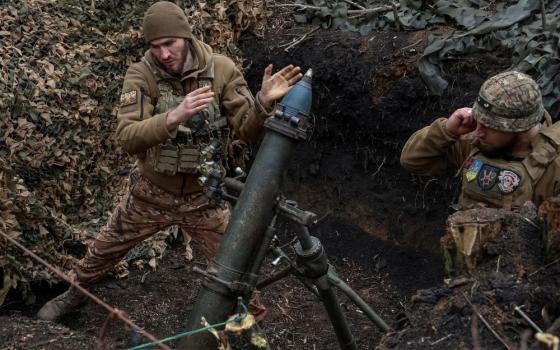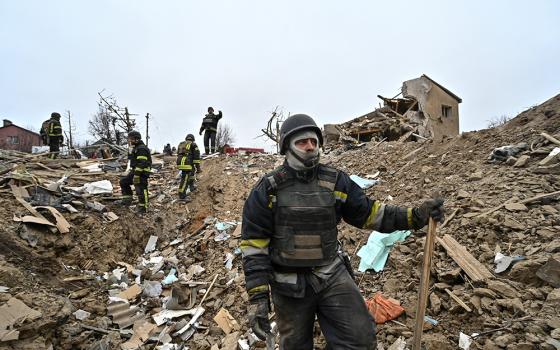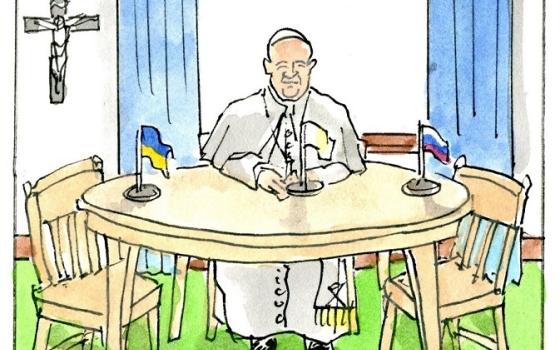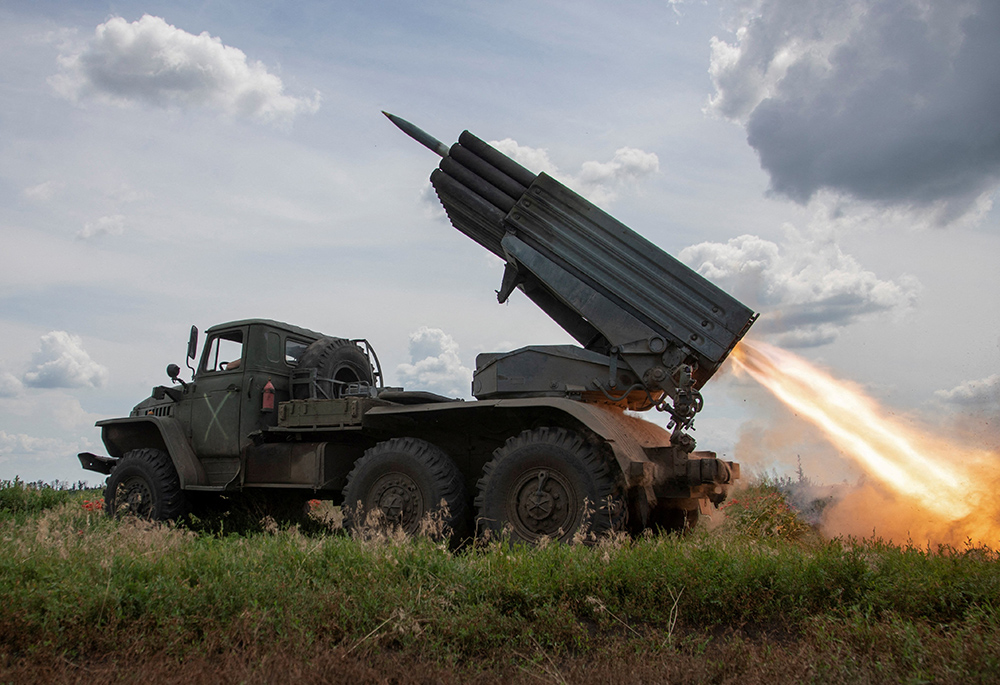
Ukrainian servicemen fire a BM-21 Grad multiple launch rocket system toward Russian troops near a front line in Ukraine's Donetsk region June 21, amid Russia's ongoing war on the country. (OSV News/Reuters/Oleksandr Ratushniak)
The Ukrainian counteroffensive is well under way. As the war continues, the tragedy of more lives lost, and more children orphaned and captured also continues. My friend Alex Kuzma forwarded me a letter from Marti Bombyk of Ann Arbor for Ukraine, with a report from the Institute for Religious Freedom, detailing that as of January, the Russian military had destroyed nearly 500 religious sites in Ukraine.
As the fighting intensifies, Christians on both sides should be asking ethical questions. Is the war in Ukraine a just war? Is it being fought justly with care for civilians? How should the war be justly resolved?
From apostolic days Christians have struggled with their obedience to the Fifth Commandment: "Thou shalt not kill." We are aware of the teaching of Jesus to "love our enemies and pray for our persecutors" (Matthew 5:43-44). We are challenged by the example of Jesus who told Peter to put away the sword after he cut off the ear of the high priest's servant (John 18:10-11; Matthew 26:51-52.) But we are also challenged by the advice of Jesus to his followers that from now on "one who does not have a sword should sell his cloak and buy one" (Luke 22:36).
The ethics of war have been a challenge in every age. Down through the centuries, Christian ethical thinking on warfare has been of divided mind. Two broad and contradictory camps have emerged: the absolute pacifist camp and the "just war" camp.
For the first 300 years of Christianity, Christians were predominantly "pacifist." This was not so much theoretical pacifism as it was practical pacifism. Christians regarded the Roman Empire as the great beast. They had no desire to fight for it. Moreover, they were a marginalized and powerless group. Apart from a few judges who converted, they were not responsible for the decisions of the Roman Empire. Their ethical decisions were personal decisions. Often, when Roman soldiers converted to Christianity, they "put off the military belt." as they would have said. For example, St. Martin of Tours (316-397) left the Roman army after his conversion to Christianity.
But almost immediately after Constantine's Edict of Milan (313) made Christianity a "tolerated" religion in the Roman Empire, the Christian church began to justify warfare. Some people see this as a sellout to power. Some see it as a mature attempt to deal with ethical questions that come with the exercise of power. The just war theory emerged.
St. Augustine (354-430) was among the first Christian thinkers to recognize the possibility of a "just war." He focused on just causes for war. His tradition was refined and amplified by such thinkers as St. Thomas Aquinas (1224 or 1225-1274) in the Middle Ages and by Francisco de Vitoria of Spain (circa 1483-1546) at the beginning of the modern age (who opposed colonial wars). The criticism of the "just war theory" is that it has never stopped a war. Some call it the "justified war" theory. It is really more about limiting the violence of war than about justifying warfare.
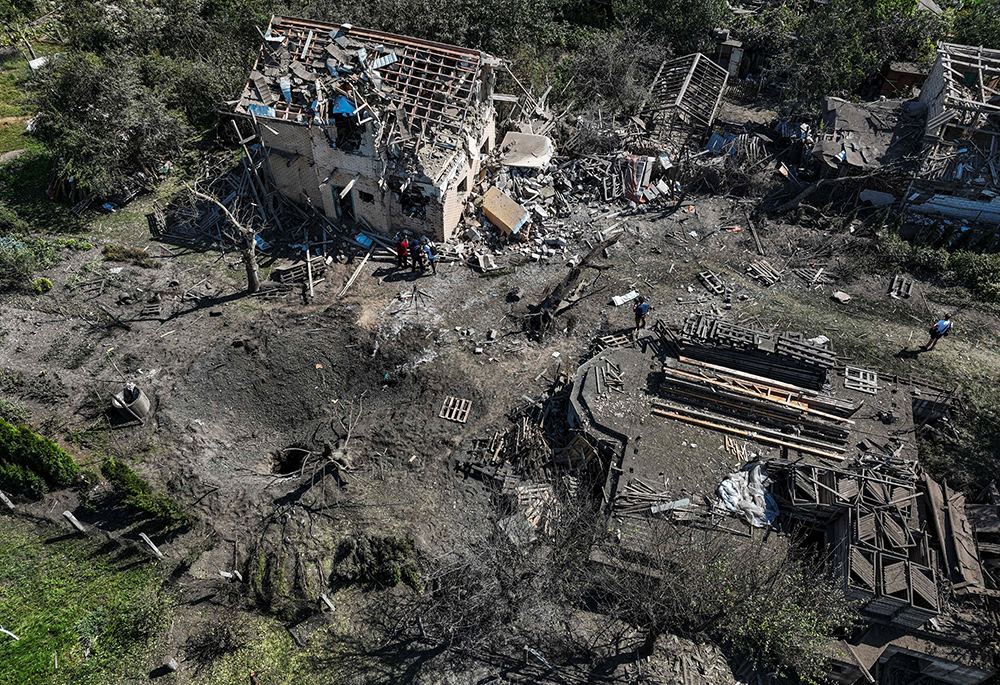
A view shows a house destroyed in a Russian airstrike on Kyiv, Ukraine, Aug. 27. (OSV News/Reuters/Yan Dobronosov)
To be a just war, a conflict must be just at all stages and in all its parts. It must be just in its cause that led up to the war, (jus ad bellum), just in each act of war (jus in bello), and result in a just resolution (jus post bellum).
Saints have been both pacifist and warriors. Francis of Assisi, who had fought in a local Italian military expedition in his youth but later experienced a profound conversion, tried to end the Crusades. Joan of Arc and Ignatius of Loyola fought in wars. After the Protestant Reformation, the pacifist Christian tradition was reinvigorated in pacifist churches such as the Quakers, the Mennonites, and the Amish.
However, since the fourth century, the Catholic ethical thinking on war has been predominantly in the "just war" camp. Sometimes our church itself has been warlike. Pope Julius II scandalized Europe by actually putting on armor and going into battle for the Papal States. The church promoted war in the Crusades, a continuing scandal. In our own era, some recent Catholic thinkers, like Dorothy Day in the Catholic Worker movement, adopted the pacifist position, even in World War II.
Today the just war theory is again being called into question. "Total war" makes it impossible to protect noncombatants. Frightful new tactics, like the bombardment of cities, and frightful weapons like poison gas and nuclear weapons, make it difficult, if not impossible, to fight a "just war."
Advertisement
In an interview with an Argentinian news station in June of 2022, Pope Francis said, "I believe it is time to rethink the concept of a 'just war.' A war may be just, there is the right to defend oneself. But we need to rethink the way that the concept is used nowadays."
The Catechism of the Catholic Church allows for "legitimate defense" of oneself or of a society (Paragraph 2263). While everyone has an obligation to safeguard peace and avoid war, (Paragraphs 2302-2306), there are times when "legitimate defense by military force" may be justified (2309).
So, is the Ukrainian war just? I think that it can be said that the war in Ukraine is "justified" for the Ukrainian side, provided that they proceed ethically. It is an unjust war from the Russian side. There are at least seven requirements for "just war." List of requirements vary and sometimes considerations are combined.
Jus ad bellum
Just war requires a "just cause." The Ukrainians have the preeminent "just cause," self-defense, which was mentioned by Francis. Ukraine was attacked. Russia is the aggressor. One can be justified in fighting when the aggressor inflicts "lasting and grave harm" on a nation or community. The reasons the Russians gave for their attack, like the intent to "denazify" Ukraine, or the threat from NATO countries, was clearly false. The Russians were not threatened.
A just war requires that war be a last resort and that all peaceful means to resolve a dispute have been exhausted. Russia made absolutely no attempt to resolve its purported disputes peacefully. It simply attacked without provocation.
The war must be fought with "right intention." Combatants (on both sides) must not use the war to fight for "unjust goals," such as grabbing wealth or land, or revenge, retribution, genocide, personal enrichment, or political gain. Russia has made widespread use of mercenary armies, like the Wagner Group. Defense contractors on both sides are no doubt getting wealthy. In the case of the Ukrainian war, Russia never had a right intention. This is a war of conquest to make Ukraine a vassal of the Russian Federation.
Jus in bello
Prosecution of a war requires two things. There must be a reasonable chance of success and there must be "proportionality" in the means. It is not morally licit to send people to be slaughtered in a hopeless fight, as was done in World War I. The fighting in Bakhmut was described as a "meat grinder," especially for the Russian side.
Proportionality requires that the harm done by warfare must not be greater than the goal to be achieved. The harm must also end when the war ends. In the Middle Ages this meant that armies must not poison water wells or salt fields. In the modern era proportionality means that chemical, biological, and nuclear weapons must not be used, since they inflict harm for generations after the war ends.
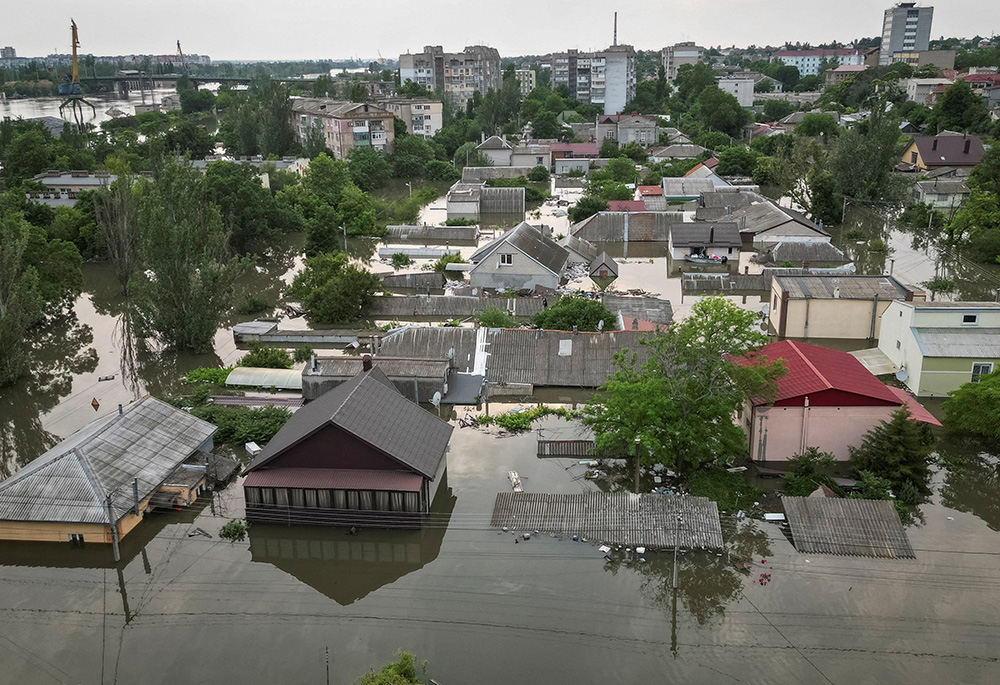
A view shows a flooded area in Kherson June 7 after the Nova Kakhovka dam breached, amid Russia's attack on Ukraine. (OSV News/Reuters/Vladyslav Smilianets)
Some acts of war, like causing long-term damage to the environment, are in themselves war crimes, because of their horrific consequences. In Ukraine, the demolition of the Kakhovka dam was an example of disproportionality, flooding many villages and towns and causing long-term environmental damage. The past fighting that took place close to the Zaporizhzhia Nuclear Power Plant could have spread radiation over a huge area, including Russia.
War should only be waged on military combatants and military targets. All noncombatants should be protected from harm, especially the defenseless, like children, the elderly and the sick. On this point, Russia is clearly in violation of the ethics of a just war. It has intentionally attacked civilian targets like apartment blocks, hospitals, schools, orphanages, and clinics. So far Ukraine has used admirable restraint, except in some cases. All actors must avoid "collateral" damage to civilians.
Jus post bellum
As soon as possible, the combatants must be willing to lay down their arms and negotiate peace if there is a reasonable prospect for a just and lasting peace. This means that Ukraine should be ready to negotiate, but it does not mean that they must surrender. Asking the Ukrainians to negotiate now would simply allow Russia to achieve its unjust ends at the negotiating table instead of on the field of battle.
There must also be justice after a war, which includes a just peace treaty, provisions for reconstruction, environmental remediation, war crimes trials, and war reparations. Putin has already been charged with a war crime in the kidnapping of Ukrainian children by the International Criminal Court, as David Bonior has noted. The cost of rebuilding Ukraine will be enormous. Russia must pay for the damage it has done.
The just war view recognizes that there are times when one must oppose evil with force. When David Bonior and I visited Poland and Ukraine in March, we stopped at Auschwitz, where 1.1-1.5 million people were murdered in World War II. That place demonstrates the ethical imperative to fight evil. Christian thinkers such as Reinhold Niebuhr argued in the 1940s that there are occasions when Christians can ethically fight.
Ukraine is engaged in a just war. Russia is not. Ukraine seeks to defend itself from a grave evil and stop the further wrong of oppression. For us, it is morally licit to support them in their struggle, so long as we use "proportionate means" and seek to limit the spread of the war and protect noncombatants.





